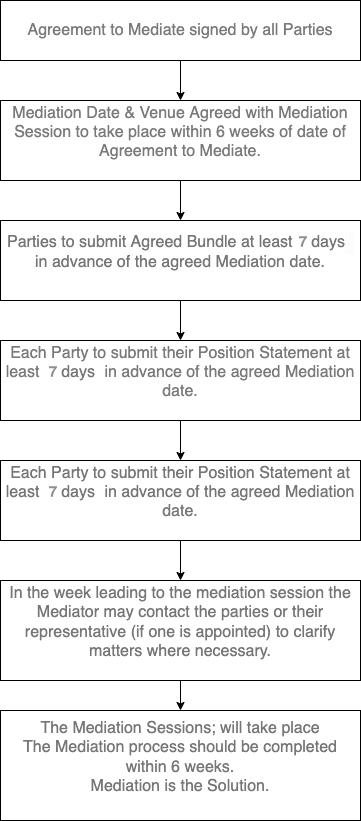Mediation Explained
1. What is Mediation
A Mediator is a neutral person who assists parties to reach their own resolution to a dispute.
A Mediator has no power to order or decree any outcome and any settlement is the result of agreement between the disputing parties.
A Mediator will not assess the merits of any particular side to a case, but will challenge each side to think differently about the strengths and weaknesses of their case. The Mediators aim is to assist the parties to the dispute to reach an agreement.
A Mediator will be independent and act in an impartial manner throughout the process.
The discussions and exchanges of information throughout the Mediation process are subject to confidentiality. In the event of the disputes not being resolved, and litigation commencing or continuing, the Mediator cannot usually be compelled to disclose confidential information communicated to him/her in the course of the Mediation. Save very limited circumstances.
Any negotiations and discussions within Mediation is treated on a without prejudice basis and the Courts will not take such discussions into consideration should the matter proceed to litigation. The Court will, however, seek confirmation that the parties have attempted mediation.

2. Know the costs of your dispute
Each legal representative to the Mediation should set out to their client the costs of the dispute.
3. What happens on mediation day?

The Mediation Session will start in one of two ways;
- All parties will be in the same room, the Mediator will provide the parties with an overview of the process. The Mediator may then invite the parties to set out their position on the matter.
- The parties will be in separate rooms and the Mediator will introduce him/herself to the parties and explain the overview of the process. The Mediator may then invite the parties to set out their position on the matter.
The mediator on assessing the papers will take a view on the best approach to the Mediation session.
From time to time in the course of the Mediation there will be separate Private meetings with the parties and their representatives to explore factual and other enquiries about the disputes and possible settlement options.
In a private session ALL discussions are treated as confidential, the Mediator WILL NOT disclose any information or communicate same to any other party or representative without the express permission from the party offering the information.
Mediation is aimed at being flexible with a focus on a resolution. As such, the Mediator will normally adopt an approach suitable to the nature of the dispute. The Mediator will normally try and operate an informal process and reassure the parties as to the benefits of the confidentiality and openness that Mediation can offer to bring a dispute to a resolution.
4. Your Mediation Timetable

5. Agreement to Mediate
An Agreement to Mediate will be provided to both parties to sign. This agreement sets out the roles and obligations of the without prejudice nature of mediation.
The Agreement will cover all aspects of Mediation and the process cannot start until all parties have signed the Agreement.
6. A Mediation Bundle
It is important that the parties provide an agreed bundle of documents to the Mediator. This may be any letters and/or documents exchanged. If litigation has commenced, it may include the pleadings to same. Any statements furnished between the parties.
The aim of the bundle is to set out the dispute as to where each party is vis-à-vis the other. This will assist the Mediator to identify the differences between the parties and potentially identify at an early-stage any areas of possible resolution.
In agreeing a bundle the parties should try and only include the documents specifically relevant to the dispute.
7. Position Statement
Each party may provide to the Mediator a position statement. This statement should aim to set out that Party’s views on the dispute.
Remember the Position Paper is aimed to give the Mediator your view on how you see your case, the strengths, the weaknesses and how this dispute came about.
It is not encouraged to set out what the objective or wishes of the party is, as often this can lead to the party feeling committed to that approach. The Mediator will discuss possible resolutions directly with the parties at the mediation session.
The position papers are ONLY for the Mediators attention and no content of the document will be disclosed to the other party without express consent to do so.
8. Mediation Agreement
If agreement is achieved whereby the parties reach an resolution on all or part of the aspects of the dispute, any such items of agreement will be reduced to writing and signed by all those present.
The Mediator will normally record the terms of agreement in an electronic format and request the parties to electronically sign the agreement. The signed agreement can then be circulated with the parties immediately following the conclusion of the Mediation.
9. Conflict of Interests
The Mediator will confirm prior to the signing of the Agreement that no Conflict of Interest arises. It is important that the parties identify any potential or perceived interest at this time.
The potential for a Conflict of Interest is kept under constant review. At the Mediation Session the Mediator will again confirm that there is no perceived Conflict of Interest.




